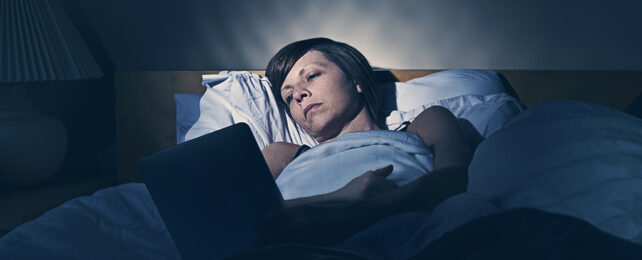We're not sure exactly how many people have insomnia – estimates range from 10-60 percent of the population – but we are confident that it's linked to several long-term health issues, including depression and cardiovascular disease.
A new study outlines how insomniacs might make their condition even more tiresome: clock-watching (or time-monitoring behavior (TMB), to be technical). It seems this can aggravate insomnia, increase frustration, and lead to higher use of sleeping aids.
It's a sort of negative feedback loop, the researchers found. TMB worsens insomnia and its associated annoyances, leading to more clock-watching and so on.
"People are concerned that they're not getting enough sleep, then they start estimating how long it will take them to fall back asleep and when they have to be up," says clinical psychologist Spencer Dawson from Indiana University Bloomington.
"That is not the sort of activity that's helpful in facilitating the ability to fall asleep; the more stressed out you are, the harder time you're going to have falling asleep."
Dawson and his colleagues looked at sleep-specific data from 4,886 patients who completed a questionnaire at a sleep medical center in Arizona: the severity of their insomnia, the time spent monitoring their behavior while trying to sleep, and their use of both over-the-counter and prescription sleep medications.
The team then used mediation analyses, where variables are statistically compared against each other to find a relationship. Here, insomnia is the cause, sleep medication use is the result, and clock watching is the suspected 'mediator' in the three variables.
A strong connection between all three factors was found in the data. Those with both insomnia and associated psychiatric conditions reported more clock-watching and greater use of sleep aids.
The researchers also asked the participants about the frustration caused by TMB and TMB itself: that meant they could link this frustration to the use of medication to better get to sleep. It's substantial evidence for the hypothesis that clock watching drives the use of sleep aids, primarily because the resulting frustration makes insomnia worse.
"We found time monitoring behavior mainly has an effect on sleep medication use because it exacerbates insomnia symptoms," says Dawson.
TMB wasn't the only driver for medication, however. Frustration with not being able to sleep, the researchers noted, is just as important when it comes to dealing with insomnia.
The researchers recommended specific therapies – cognitive restructuring or addressing emotional processing – to further alleviate frustration, thus further alleviating the use of sleep medications.
The research was carried out as part of a broader look at the frequent use of sleep medications, both on prescription and over the counter. These medications come with worries about health risks and long-term effectiveness.
In other words, the fewer people using them, the better. If that number can be lowered through simple interventions like checking the clock less often while trying to sleep, then it's worth investigating.
As well as recommending future studies into TMB in even larger groups of people over more extended periods of time, the researchers suggest that taking measures to remove the temptation of checking the time might be helpful.
"One thing that people could do would be to turn around or cover up their clock, ditch the smart watch, get the phone away so they're simply not checking the time," says Dawson.
"There's not any place where watching the clock is particularly helpful."
The research has been published in the Primary Care Companion for CNS Disorders.
